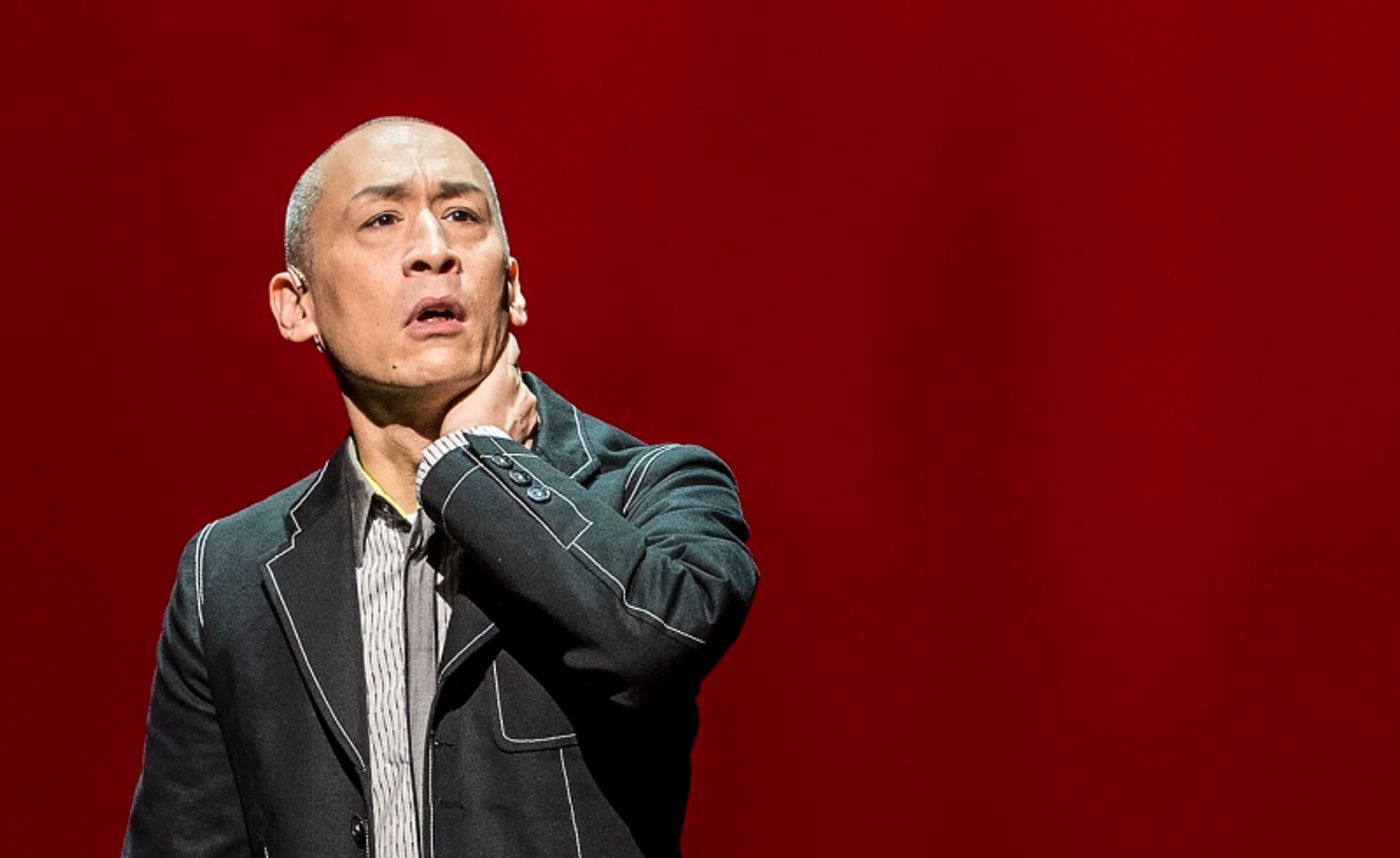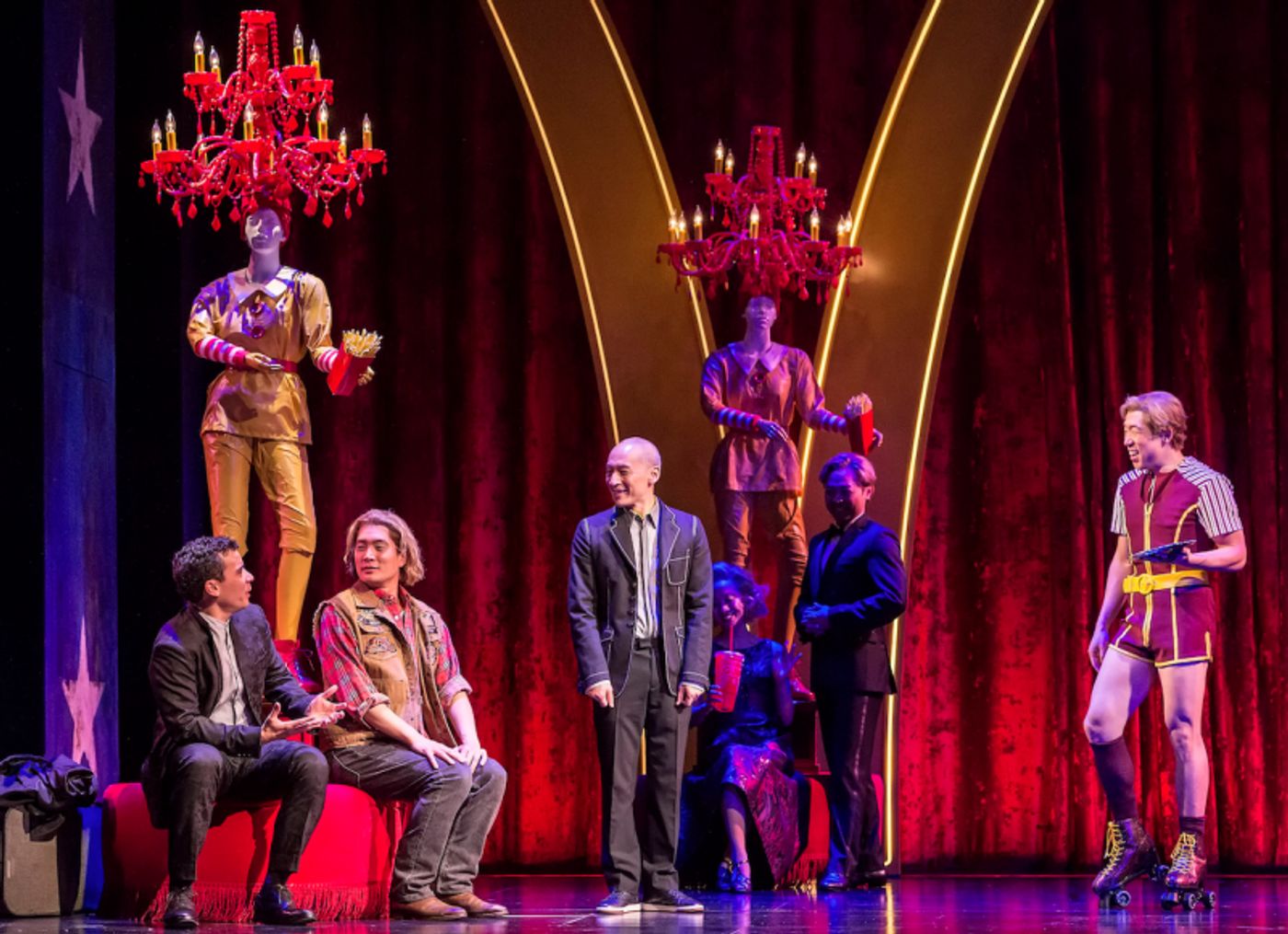Interview: Francis Jue becomes David Henry Hwang (sort of) in SOFT POWER, the fabulous fantasy at the Curran

This weekend is your last chance to see the spectacularly original Soft Power by David Henry Hwang and Jeanine Tesori at the Curran Theatre. The audacious and highly entertaining production, directed by Leigh Silverman and choreographed by Sam Pinkleton, features a gifted cast of all Asian-American actors (save Alyyse Alan Louis as a ferociously vibrant Hillary Clinton) led by Drama Desk Award nominee Francis Jue (M. Butterfly and Pacific Overtures on Broadway), in the very meta role of David Henry Hwang. The production is described as a play in a musical and at one point pivots to direct narrative to a fantasy adventure in which the premise of The King and I is used as the basis of a "classic" Chinese musical in the future.
A native San Franciscan, Jue attended St. Ignatius College Preparatory School prior to Yale University. He returned home and worked at the San Francisco AIDS Foundation and performed as an Equity member with Bay Area companies including TheatreWorks Silicon Valley the Asian American Theater Company.
Jue currently plays the recurring role of Foreign Minister Chen on the hit series Madam Secretary opposite Téa Leoni. Other television credits include the New York-produced theatre actor staples Law & Order, Law & Order: SVU, and The Good Wife.
He blames his career on his brother Geoffrey, still in the Bay Area and currently serving on the board of San Francisco Playhouse.
RS: Why is it his fault?
FJ: When he was a senior at St. Ignatius, he did a production of The King and I and played the prince. I was in eighth grade and our family, which was not a theatre-going family, went to see him. As far as I can recall, it was the first live musical I ever saw. It was transcendent. It was beautiful. My brother was great and I knew in a flash that that was my calling.
I was a shy kid, underweight and really insecure. I couldn't talk to people, but I knew that I could do that. It became like religion to me. It articulated things for me that I couldn't articulate for myself in real life. I didn't think I would ever get to do it, but seeing Geoffrey in The King and I made me realize that this was the way for me to actually become a human being.
RS: For better or worse, is there any Asian American actor who does not have The King and I in their resume somewhere?
FJ: You know, for a long time, I resisted it. I was offered the role by Paul Blake at the Muny. He called me up and said, "I want you to play the king next summer in St. Louis." I said, "No." I had this idea that everyone wants a king who has pecs the size of my head (Laughs) and acts like an adolescent who wants to take his ball and go home. I didn't want to play the king that way.
I remembered, when I watched that high school production, the dignity of the king. His searching, the way that I searched for the right way to be in this industry and in this craft. This revolutionary king who thought outside the box, who educated himself, who wanted his country to join the family of nations, and who struggled with being a man who was born in this time and place. Isn't that more interesting?
He said, "Dahling, I want you to play the king the way you want to play the king. We have never had an Asian man play the king before and I want that." So I said, "Well as long as you let me do that, then I will be your king... but I never want to have to take my shirt off." He said, "Sure."
By the time I got to St. Louis, I learned to trust him and he learned to trust me. During the costume fitting I said, "Okay. It's like 110 degrees at 8:15 at night. I want to take my shirt off." (Laughs)
I worked hard to look at the show from what I think Oscar Hammerstein really intended, which was really revolutionary in its time. I wanted to understand this monarch and his culture from a compassionate and sympathetic point of view. I think that there are a lot of students now who say they never want to play people with accents, they never want to do The King and I, they never want to play a concubine or an immigrant and I think it is great that young actors of color have choices. They can decide what kind of career that they want. They can stay focused on who they are and try to project that in their careers.
From my perspective and from my age, from how I grew up, I know a lot of people with accents who have dignity and who are foolish, who are complicated and who are sympathetic and reflect the human condition. I know a lot of immigrants. I know a lot of people from other cultures who also deserve to be portrayed with dignity, or with integrity.
Whether they are good people or bad people, or foolish or noble, I think that these are characters who deserve to be portrayed well, and if an actor is given an opportunity for that kind of performance the way that I was by Paul Blake at the Muny, then yes, I am up for it. I think of that as part of my social compact in this industry and with the audience. That's part of what is so moving and joyful to me about Soft Power. I love being able to portray somebody who is a real person - no pressure there, of course! - who also happens to be the playwright who comes from a family that immigrated to this country and who also has a point of view that others who aren't the playwright and who don't come from a family who immigrated can also identify with.
I've often said, when I go to see The Crucible, I don't assume that all white people are crazy witch hunters who burn people at stakes. I assume that these are people with whom I should try to find something in common. I don't often feel that way when the story is focused on Asian people. Often times, my impression of audiences [for Asian-themed plays] is that they're encouraged to come to an exotic experience, as though they're going to a museum. Or the zoo.
So, my first job in any show when the story is focused on culture or race, is to prove that I'm a human being. That I am simply playing a character. That it is not some kind of cultural experience but rather, it is a play. That can be challenging sometimes, but I have not experienced that at all with Soft Power. Audiences embraced the show from the moment it began, saw the humor and the foibles and the struggles of these characters immediately. Even when they disagreed with some of the arguments made in the show, we were being disagreed with as human beings, not as representatives of a culture. I give all the credit in the world to our creative team, to David, Jeanine, and to Sam and to Leigh for the hard work they did. They were tough on themselves in order to really say what they mean and mean what they say. I never felt the need to prove my humanity in this show.

RS: I can't imagine that there is a better time than right now for this production to be happening, socially, culturally, politically.
FJ: I've actually just recently been tagging onto that. When the lights come up at the end of the show, it feels like this is a show that audiences have needed to see. It answers something that is happening right now and at the same time it's timeless. It's a show to me that is about how we define ourselves and other people in relation to ourselves.
What does it mean to be an American? That's a theme that you can find in musicals like 1776 or plays like The Crucible or in Death of a Salesman. I think that kind of identity question is timeless and yet something about it right now has a particular resonance because we seem to be going to a real time of change and struggle with that question. It's something that I think David faced head on when he was attacked a couple of years ago and nearly died and then learned that the best theory that the police had for the crime was that he was targeted simply because he's Asian.
Here he is, a famous, affluent, well-respected member of not just the theatre industry but of the country, and none of that could protect him. None of that shielded him from having his Americanness questioned and even assaulted. I think that that's a feeling that a lot of people share right now. Whether you're on the right or the left of the spectrum, whether you are a person of color, or a woman, or nonbinary, or not. I think that a lot of us are feeling under attack, that a lot of us are being questioned.
So, this show struggles with that and talks at it. There's humor in the ridiculous answers that we come up with in this show through the lens of the character David trying to collaborate with a Chinese producer on a television project, and The King and I suddenly getting reversed. Now, instead of a Westerner going to an Asian country, suddenly hooking up with a king and helping him through a national crisis, you have a Chinese person, coming to America suddenly hooking up with a presidential candidate and then helping the country through a national crisis.
In The King and I we never question it because it is a gorgeous story with glorious music. In our show, it's remarkable because it's told beautifully, and the music is glorious, we don't question it. We really want Hilary Clinton to hook up with this Chinese guy and for him to help us save our country. On its face, it's completely ridiculous but we do that all the time to ourselves.
RS: Is a puzzlement!
FJ: (Laughs) It is a puzzlement. When we first started developing the show a couple of years ago it didn't have a title or a script. But I knew it was going to be written by David and Jeanine, so I was like, "Well, it's you guys. So, OK." Each time we did a reading I was like, "What is this? I don't get it. How do you write music to this and make me believe it? I don't understand." They kept writing and rewriting but I really wasn't convinced until our first preview in LA. Once we had the orchestra and we were fully staged and we were in front of an audience, I burst into tears because I couldn't believe that not only was the audience believing this, but I was believing this, too.

Soft Power ends its run this weekend at the Curran in San Francisco.
Videos

